
The Complete Guide to Content Marketing Research
Have you ever felt like you’re playing a never-ending game of darts with your content ideas, blindly throwing them and hoping they hit the mark?
It’s time to put an end to the guesswork. Instead of tossing ideas into the void and hoping they resonate, there’s a more strategic approach at your fingertips: content marketing research.
This powerful tool goes beyond speculation, offering eye-opening insights into what your audience actually wants to see. And that’s just the tip of the iceberg.
In this post, we explore how content marketing research can revolutionize your strategy, ensuring every piece of content you produce is not only seen, but also genuinely valued by your audience.
Quick Takeaways
- Content marketing research is essential to making sure your content resonates with your audience and offers unique insights.
- According to a survey of professional marketers, 89% reported that their original research either met or exceeded expectations.
- Research includes understanding audience preferences, staying on top of industry trends, differentiating content, and leveraging data to make informed decisions.
- Share original insights with your audience by analyzing trends from fresh perspectives and crafting compelling narratives around data.
Understanding the Basics of Content Marketing
At its core, content marketing is about creating and sharing valuable, relevant and consistent content.
Instead of pitching your products or services directly, you’re sharing information that helps your audience understand and solve their problems through blog posts, case studies, infographics, and other forms of content.
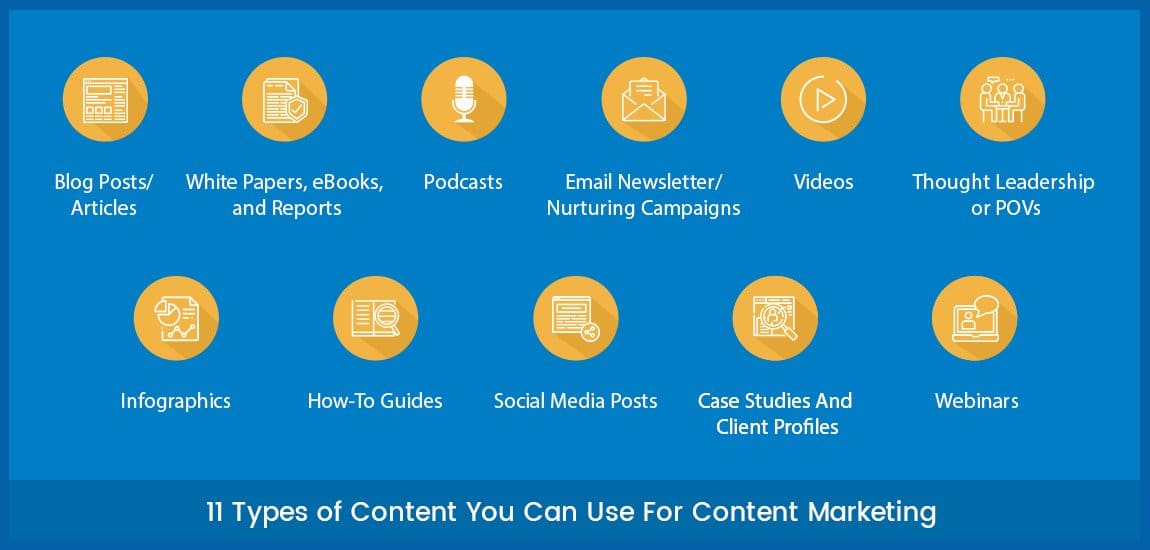
Image Source: E2M Solutions
The Strategic Approach to Content Marketing
Every piece you create should have a clear purpose. Here’s how to make sure your content is strategic:
- Identify your audience. Before you write a word, know who you’re writing for. Understand their pain points, their needs, and the questions they’re asking during each stage of the customer journey.
- Set clear objectives. Are you aiming to generate leads, boost brand awareness, or establish thought leadership? Your content should align with your goals.
- Choose the right channels. Not all content fits every platform. A detailed whitepaper might thrive on LinkedIn but may not get the same traction on Twitter. Tailor your content to the platform and the audience it reaches.
- Engage and interact. Content marketing isn’t a one-way street. Engage with your audience, respond to their comments, and encourage discussions. It’s about building relationships, not just broadcasting messages.
In the B2B world, sales cycles are long and decisions are collaborative. 82% of companies are already using content marketing to nurture leads, build trust, and position their company as a thought leader. By using a strategic approach, you can leverage content marketing to drive engagement and business growth.
The Role of Research in Content Marketing
Research is the backbone of effective content marketing, especially when it comes to B2B. It provides you with invaluable insights, making sure your content isn’t just a shot in the dark.
Content marketing research helps you:
- Understand your audience’s needs and preferences
- Stay updated with industry trends and shifts
- Differentiate your content from the sea of information on the internet
According to a survey of professional marketers, 89% reported that their original research either met or exceeded their expectations.
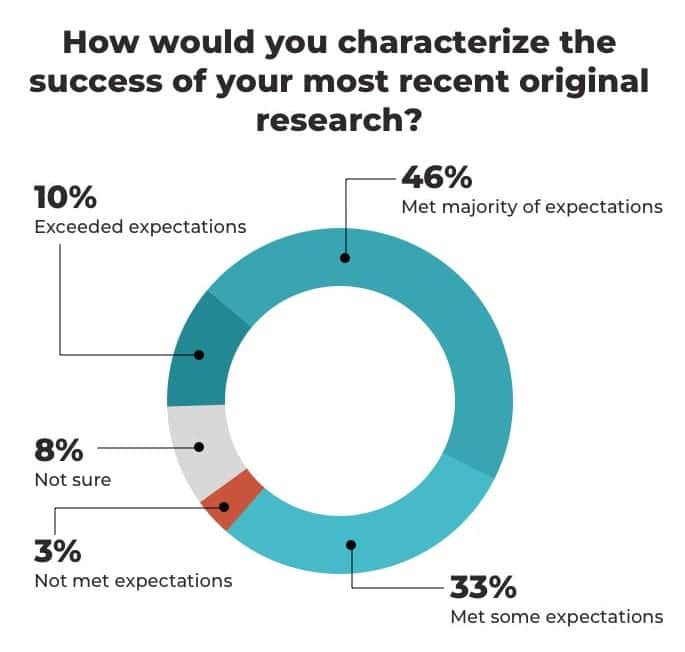
Image Source: Orbit Media
Making Informed Decisions
With solid research, you can:
- Tailor content to your audience. Know what your audience is looking for and create content that speaks directly to their needs.
- Spot opportunities. Identify gaps in the market or topics that haven’t been extensively covered. This is your chance to shine and offer something unique.
- Measure and adjust. Track how your content performs. If something’s not working, research will help pinpoint the issue so you can tweak your approach.
Staying Ahead of The Curve
In the fast-paced B2B environment, staying updated is crucial. Research helps you:
- Keep an eye on competitors and stay one step ahead
- Understand emerging technologies or methodologies that can impact your industry
- Ensure your content remains relevant and timely
Building Credibility
Well-researched content not only informs, but also builds trust. When your audience sees that you’ve done your homework, they’re more likely to view you as a credible source and industry leader.
Practical Steps to Conduct Content Marketing Research
With a clear roadmap, content marketing research is a breeze. Let’s walk through some practical steps to make sure your research game is on point:
1. Define Your Objectives
Before diving into research or content creation, it’s essential to nail down your objectives. Start by asking yourself:
- What do I want to achieve with my content? Is it brand awareness, lead generation, customer engagement, or something else?
- Who am I trying to reach? Is it industry leaders, potential clients, or maybe a niche segment within your market?
Make sure your content objectives sync up with your broader business goals. If your company aims to break into a new market segment, for example, your content should reflect and support that.
By taking the time to define and refine your objectives, you’re laying a solid foundation for your content marketing efforts. It ensures that every piece of content you produce has a clear purpose and direction, maximizing its impact and effectiveness.
Want to learn more about setting strategic content marketing goals? Watch the video below, or read our article on The Ultimate Guide to a Content Marketing Strategy That Delivers ROI.
Video Source: LinkedIn Learning
2. Know Your Audience Inside Out
To truly get to the heart of your target audience, it’s essential to use a multi-faceted approach. Start by conducting surveys or personal interviews.
While surveys can provide a broad overview of preferences and consumption habits, interviews allow for a deeper dive into the specific challenges, pain points, and aspirations your audience faces.
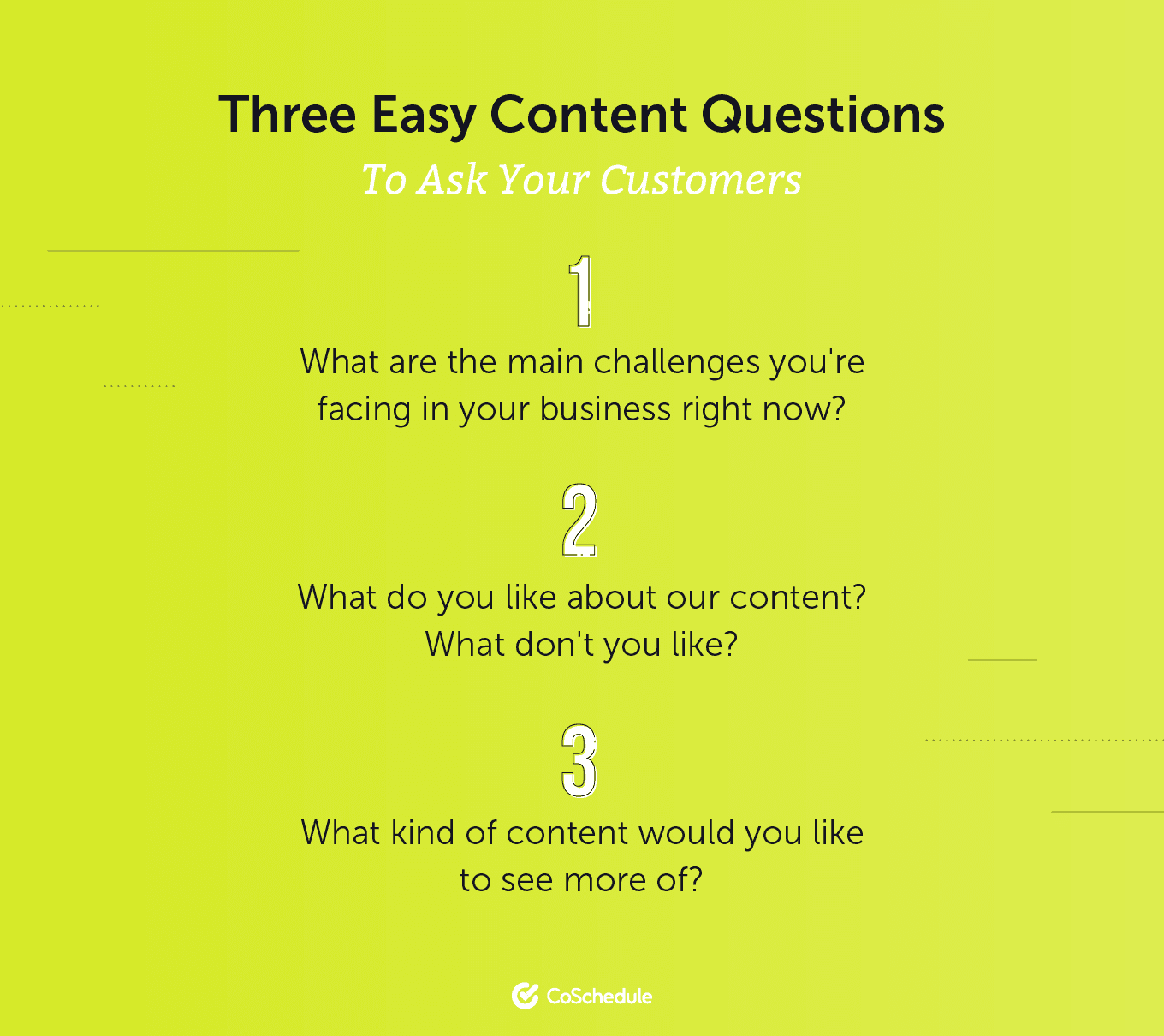
Image Source: CoSchedule
But don’t stop there. Leverage analytics tools, like Google Analytics, to gain insights into which topics resonate most with your audience and how they engage with your content. Beyond just views, consider metrics like:
- Comments
- Shares
- Time spent
Lastly, immerse yourself in industry groups. Platforms like LinkedIn and industry-specific forums can offer invaluable insights. Actively participate in these communities, ask probing questions, and, most importantly, listen. By monitoring discussions, you can identify recurring questions or challenges, providing inspiration for future content topics.
3. Scope Out the Competition
Keeping an eye on the competition is key. Engaging in a bit of competitive intelligence can provide invaluable insights to refine your strategy.
Start by pinpointing your key competitors and diving deep into their content strategy. What topics are they covering? What formats do they use most? As you analyze their approach, look for gaps or areas they might be overlooking. These gaps present opportunities for you to step in and offer something unique or more comprehensive.
However, it’s not just about finding their weak spots. Recognize what your competitors are doing exceptionally well. By understanding their strengths, you can draw inspiration and think of ways to elevate your own content, ensuring it’s not just on par but stands out in the crowded content landscape.
4. Dive into Data
Embracing analytics tools is one of the most used methods for gaining insights to refine your strategy. This enables you to make data-driven decisions, which are paramount for content marketing success.
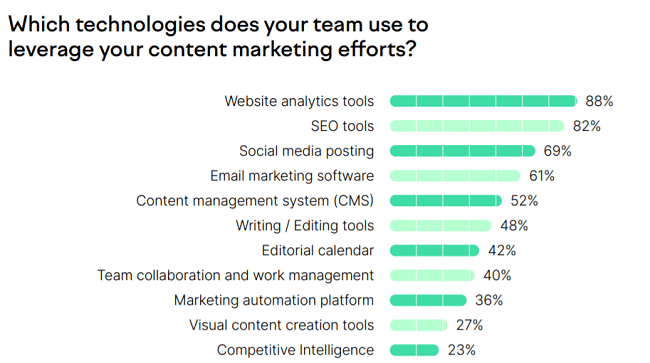
Image Source: Blogging Wizard
Start by tracking which topics or formats truly resonate with your audience. Are they more inclined towards long-form articles or bite-sized infographics?
Next, dive into your traffic sources. Are most of your visitors coming from organic search, social media, or direct referrals? Understanding these pathways can help you optimize your content distribution.
Dive deeper to measure engagement levels, conversion rates, and how often your content is shared across platforms. By immersing yourself in this data, you can tailor your content to better align with your audience’s preferences and drive tangible results.
5. Stay Updated with Industry Trends
Staying updated with industry trends is key to keeping your content fresh and relevant. One effective way to keep a pulse on the latest developments is by subscribing to industry newsletters or magazines, which often curate and highlight the most pertinent information.
Also, attending webinars, workshops, or conferences can provide deeper insights and expose you to a broader range of perspectives. Beyond these resources, actively engaging with thought leaders and influencers in your field can offer firsthand knowledge and expertise.
6. Test and Iterate
The process of research in content marketing doesn’t end once you hit the ‘publish’ button. In fact, that’s just the beginning.
After rolling out your content, you have to monitor its performance closely. This involves tracking:
- Metrics
- Engagement rates
- Overall reception
Equally important is gathering feedback directly from your audience. Their insights can offer a clear picture of what’s resonating and what might be missing the mark.
Based on the information you find, adjustments to your strategy are essential. By adopting a test-and-iterate approach, you ensure that your content remains dynamic, relevant, and fine-tuned to your audience’s changing needs.
7. Organize Your Findings
To make sure your findings are easily accessible and actionable, keep them well-organized. Using tools like spreadsheets or content management systems can help streamline this process, allowing for efficient categorization and retrieval.
However, the world of content marketing is ever-evolving, so it’s equally important to revisit and update your findings regularly, making sure they stay relevant.
Remember, content marketing research isn’t just about amassing vast amounts of data; it’s about distilling that data into actionable insights.
Crafting Content Based on Original Insights
In B2B content marketing, standing out is the name of the game. And what better way to do that than by crafting content rooted in original insights?
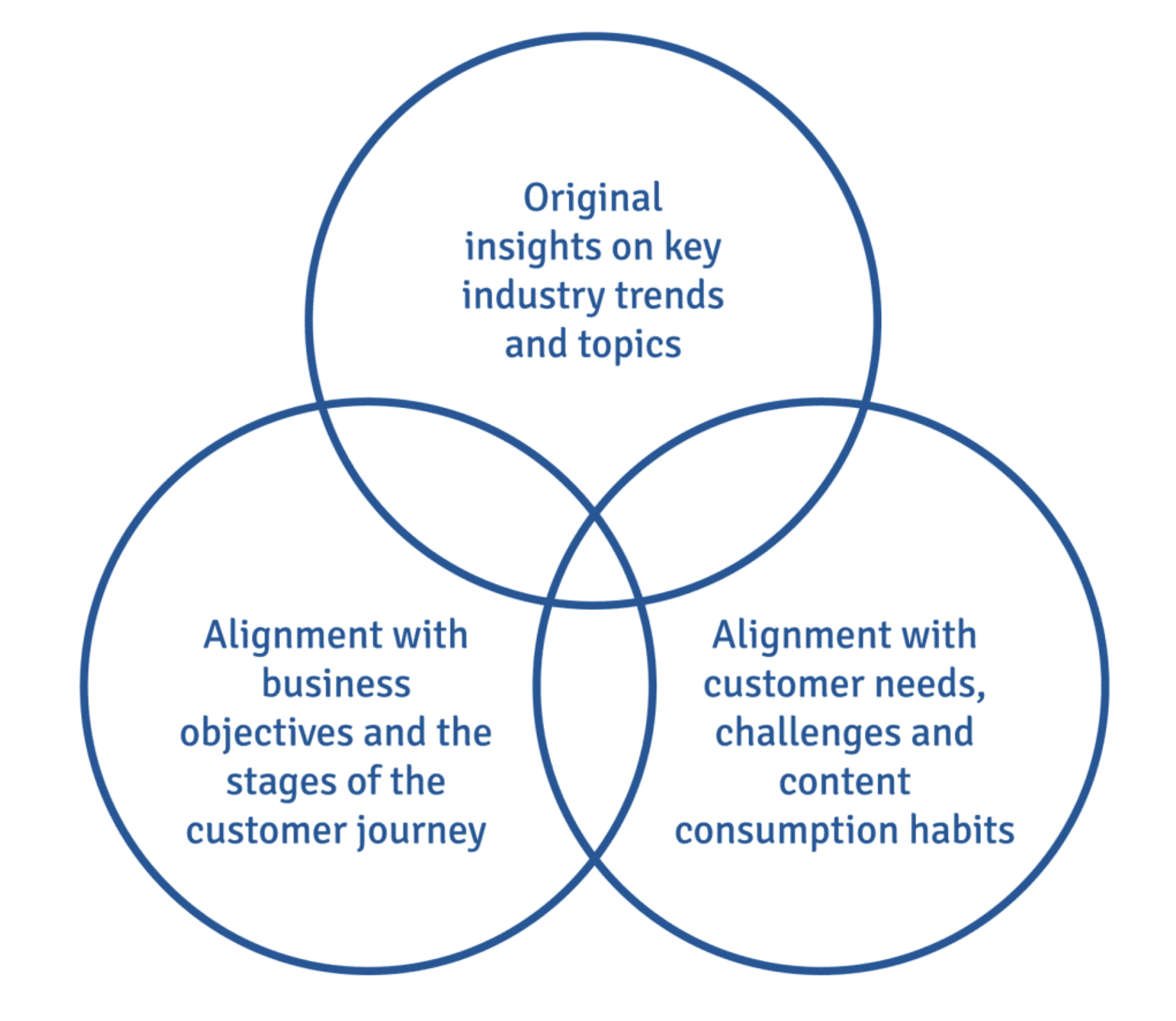
Image Source: B2B International
Let’s explore how you can make this happen:
- Original content. 58% of marketers say that original written content is the most important type, giving your content a unique flavor. Instead of echoing what’s already out there, offer fresh perspectives and make your brand a go-to source for new ideas.
- Unique Data. Consider conducting your own surveys, studies, or experiments. This not only provides exclusive data for your content, but also positions your brand as a thought leader in the industry.
- Engaging with experts. Invite industry experts for interviews or Q&A sessions. Their unique viewpoints can add depth to your content and bring in perspectives that might not be widely discussed.
- Analyzing trends. While it’s essential to stay updated with industry trends, try to approach them from a different angle. Ask questions others aren’t asking and challenge the status quo. This fresh take can make your content more intriguing.
- Storytelling with data. Data is powerful, but it’s the story you weave around it that captures attention. Use your original insights to craft compelling narratives that resonate with your audience’s challenges and aspirations.
Conquer Content Marketing Research Today
Content marketing research plays a pivotal role in your B2B journey. It’s not a one-off task, but an ongoing commitment. By diving deep into data, engaging with thought leaders, and continuously iterating based on feedback, you can make sure your content stays relevant and impactful.
Are you ready to publish quality content consistently? Check out our SEO Blog Writing Service or schedule a quick consultation to learn more about how Marketing Insider Group can help you earn more traffic and leads for your business.






